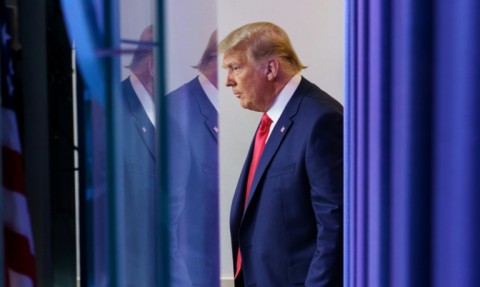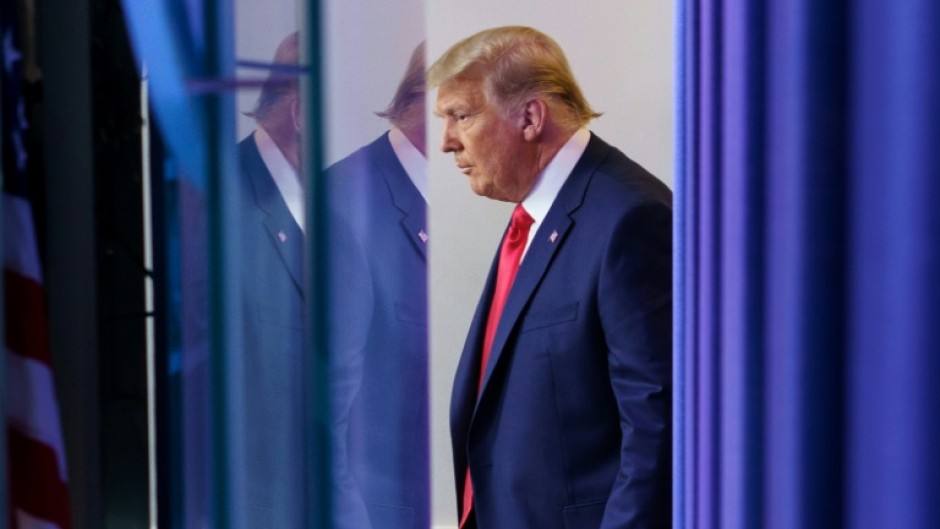A panel of US appeals court judges appeared deeply skeptical on Tuesday of Donald Trump's claim that as a former president he should be immune from prosecution on charges that he conspired to overturn the 2020 election.
The 77-year-old Trump attended the appeals court hearing held under tight security in a federal courthouse just blocks away from the US Capitol stormed by his supporters on January 6, 2021.
Trump, the frontrunner for the 2024 Republican presidential nomination, listened quietly to the slightly more than hour-long arguments before a three-judge panel of the US Court of Appeals, then addressed reporters, warning of "bedlam" in the United States if his prosecution goes ahead.
Trump, who was impeached twice by the Democratic-controlled House of Representatives while in office but acquitted both times by Republicans in the Senate, is scheduled to go on trial in Washington on March 4 on charges of conspiring to overturn the 2020 election won by Democrat Joe Biden.
Trump's attorney John Sauer told the judges that a president can only be prosecuted for actions taken while in the White House if they have first been impeached and convicted by Congress.
"To authorize the prosecution of a president for his official acts would open a Pandora's Box from which this nation may never recover," Sauer said.

"The notion that criminal immunity for a president doesn't exist is a shocking holding," he said. "It would authorize, for example, the indictment of President Biden in the Western District of Texas after he leaves office for mismanaging the border."
US District Judge Tanya Chutkan, who is to preside over Trump's trial, rejected his immunity claim last month and the judges who heard the former president's appeal on Tuesday also appeared to be unconvinced by the argument.
"I think it's paradoxical to say that his constitutional duty 'to take care that the laws be faithfully executed' allows him to violate criminal laws," said Judge Karen Henderson, an appointee of former Republican president George H.W. Bush.
- 'Not above the law' -
Judge Florence Pan, a Biden appointee, asked Sauer whether a president could be criminally prosecuted for ordered the assassination of a political rival by Navy SEAL special forces.

Sauer insisted that even in this case, the president could only be prosecuted if first impeached and convicted by Congress.
James Pearce, an attorney for the Justice Department, called that an "extraordinarily frightening" prospect and said it would allow a president to resign before being impeached and escape punishment.
Pushing back against the immunity claim, Pearce said Trump's conduct was unprecedented.
"Never before has there been allegations that a sitting president has with private individuals and using the levers of power sought to fundamentally subvert the democratic republic and the electoral system," Pearce said.
"The president has a unique constitutional role, but he is not above the law."
Trump was not required to attend the hearing but his presence -- just days before the Republican presidential primary contests kick off in Iowa -- underlined his goal of making his fight against multiple criminal prosecutions part of his political campaign.
Special Counsel Jack Smith, who brought the election conspiracy case against Trump, had asked the US Supreme Court to take up the immunity claim on an expedited basis, bypassing the federal court of appeals.
The special counsel has been trying to keep the March start date for Trump's trial on track while lawyers for the former president have sought repeatedly to delay it until after the November 2024 election, widely expected to be a rematch between Trump and Biden.
The Supreme Court, which has a 6-3 conservative majority, including three justices nominated by Trump, denied Smith's request to immediately hear the case but the appeals court decision -- wherever it lands -- is likely to wind up with the nation's highest court.
Last week, the Supreme Court agreed to hear Trump's appeal of a ruling by Colorado's highest court that would keep him off the presidential primary ballot in the western state.
Trump also faces election-related charges in Georgia -- where he has also claimed immunity -- and has been indicted in Florida on charges of illegally taking large quantities of top-secret documents with him on leaving the White House.


